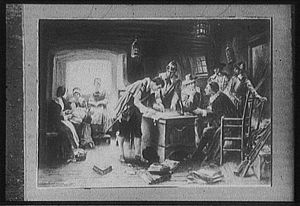Mayflower Compact

The Mayflower Compact was the first governing document of Plymouth Colony. It was drafted by the Puritan pilgrims who crossed the Atlantic aboard the Mayflower. It was signed on November 11, 1620 in what is now Provincetown Harbor near Cape Cod. Having settled at Plymouth (thus named by Captain John Smith earlier), the pilgrims recognized that their land was outside the chartered territory of the London Company. Thus, the Mayflower Compact was signed to establish a civil government based upon a majoritarian model and to proclaim the settlers' allegiance to the king. The compact was referred to by John Adams as the foundation of the Constitution of the United States, but he was speaking figuratively, not literally.
The settlers were well aware that earlier settlements in the New World had failed due to a lack of central leadership, and the Mayflower Compact was essentially a social contract in which the settlers agreed to abide by the rules of the government for the sake of their own survival. The government, in return, would derive its power from the consent of the governed.
Original spelling and unedited text from Of Plymouth Plantation by William Bradford (1590-1657), second governor of Plymouth:
- In the name of God, Amen. We, whose names are underwritten, the loyal subjects of our dread sovereigne Lord, King James, by the grace of God, of Great Britaine, France, and Ireland king, defender of the faith, etc., having undertaken, for the glory of God and the advancement of the Christian faith, and honour of our king and country, a voyage to plant the first colony in the Northerne parts of Virginia, doe, by these presents, solemnly and mutually in the presence of God, and one of another, covenant and combine ourselves together into a civil body politick, for our better ordering and preservation and furtherance of the ends aforesaid; and by virtue hereof to enacte, constitute, and frame such just and equall laws, ordinances, acts, constitutions, and offices, from time to time as shall be thought most meete and convenient for the generall good of the Colonie unto which we promise all due submission and obedience. In witness whereof we have hereunder subscribed our names at Cap-Codd the II. of November, in the year of the reign of our sovereigne lord, King James of England, France, and Ireland, the eighteenth, and of Scotland the fiftie-fourth. Anno. Dom. 1620.
The Compact was signed by the following 41 passengers (no women signed it):
- John Carver
- Digery Priest
- William Brewster
- Edmund Margesson
- John Alden
- George Soule
- James Chilton
- Francis Cooke
- Edward Doten
- Moses Fletcher
- John Ridgate
- Christopher Martin
- William Mullins
- Thomas English
- John Howland
- Stephen Hopkins
- Edward Winslow
- Gilbert Winslow
- Myles Standish
- Richard Bitteridge
- Francis Eaton
- John Tilly
- John Billington
- Thomas Tinker
- Samuel Fuller
- Richard Clark
- John Allerton
- Richard Warren
- Edward Liester
- William Bradford
- Thomas Williams
- Isaac Allerton
- Peter Brown
- John Turner
- Edward Tilly
- John Craxton
- Thomas Rogers
- John Goodman
- Edward Fuller
- Richard Gardiner
- William White
